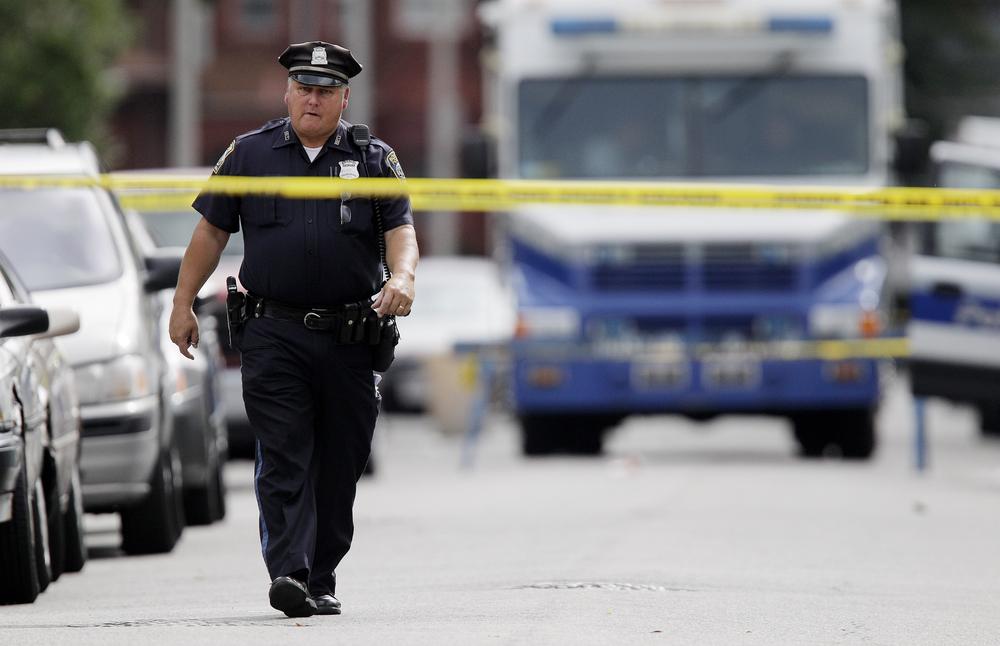Advertisement
Menino, City Officials Visit Mattapan After Murders
Resume
With the help of the FBI, Boston police are continuing to search for suspects in the shooting rampage that left four people dead, including a 2-year-old child, in Mattapan early Tuesday morning. A fifth person remains in critical condition.
Officials have not released victims' names but some family members have confirmed the identities of some of the victims.
In the neighborhood where the murders happened, city officials, including Mayor Thomas M. Menino, visited residents Wednesday to reassure them.
Flanked by police, aides and city workers, Menino went door-to-door on Sutton Street in Mattapan, around the corner from where the murders took place. The goal was to let residents know the city is there for them through after-school sessions for kids, violence prevention programs and other services. Menino urged them to get involved.
"We want you involved, because you only have strong neighborhoods when you have the residents involved,” Menino said.
“This helps because people feel unsettled,” said Boston Police Commissioner Ed Davis. “They’re afraid of what happened. And they’re uncertain, and they need to be reassured. And we’re going to do everything we can to make sure that this community feels safe.”
Violence In Mattapan, A Common Occurrence
"We sit out on the stoop when it’s nice outside, and we’re running and dodging bullets. It’s not a good thing for us."
Sheldeen Hope-Spencer, Mattapan resident
Sharon Callender, who runs a violence prevention program with the Mattapan Community Health Center, said the violence "isn't necessarily anything new.”
“But I think when it hits home it has a deeper impact. And of course, when it hits a child, because children, as we all know, are innocent," Callender said.
"And no child should be killed like this. No individual should have been killed like the way these individuals have been killed –- because it’s always a question of 'why my child, and why did this happen to them.' ”
Sheldeen Hope-Spencer, who lives in the neighborhood, said the deadly shootings have left many here badly shaken.
"And its not the first time. This is about the third or fourth time this happened, but it’s the worst it’s been for the summer," Hope-Spencer said.
"You know, we have shootings going, people getting injured. We sit out on the stoop when it’s nice outside, and we’re running and dodging bullets. It’s not a good thing for us."
Keeping The Community Safe
Hope-Spencer appreciates the mayor's visit, but she says a lot of responsibility to make things better in this neighborhood rests with the residents.
“It’s not anymore minding my own business, because it is our business. It is our business. So I think people will open their eyes now and say, 'it’s time to clean it up,' ” she said.
But others visiting Sutton Street Wednesday say the killings represented something much bigger — and much more troubling.
“That execution of those four people was a game-changer,” said Rev. Eugene Rivers. Rivers, of the Ella J. Baker House in Dorchester, has been involved with efforts to reduce youth violence in Boston since the early 1990s. Back then, he said, the murders were usually associated with the drug trade, and so they had a certain grim logic. But he said Tuesday was something much more vicious.
“How we understood violence 15 years ago no longer works when they are summarily executing people in ways that remind one of Mexico or Colombia. And the criminologists are 15 years behind where the industry of violence is in the black community,” Rivers said.
Rivers said it’s time for city officials and neighborhood leaders to come up with new ways to combat this new kind of violence. But David Kennedy, with the John Jay College of Criminal Justice, disagrees.
Kennedy helped craft the city's successful response to youth violence in the '90s. A key piece of that was Operation Cease-Fire, in which police went after entire gangs, cracking down on drug offenses and probation violations, sending a zero-tolerance message. It worked 15 years ago, and Kennedy says Boston cops are still using it.
“It has been working. And before this latest uptick in Boston, things were in fact all moving in the right direction," Kennedy said.
"There is no absolute vaccination against any of this yet, and truly awful things continue to happen."
Overall, violent crime in Boston has been decreasing in recent years, but this year there's been a spike in the number of murders. Compared with this time last year, they’re up by almost a third. But Davis doesn’t regard this as a new kind of crime — even with the murder of a child.
“I think that’s really the piece of this that has everybody so on edge. But when we get to the final motive it's going to involve the same motive that we've seen over and over," Davis said.
"It's going to involve drugs, its going to involve gangs. It's going to be one of those things that just shows that some people are willing to do anything to make money for themselves."
The shootings on Tuesday were the city's deadliest since 2005, when four young men were gunned down in a Dorchester recording studio. It took police five months to arrest two suspects, who were later convicted and are now in jail.
This program aired on September 30, 2010.
